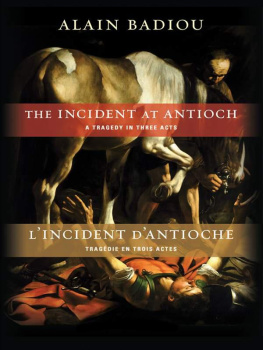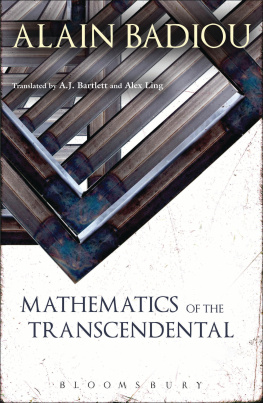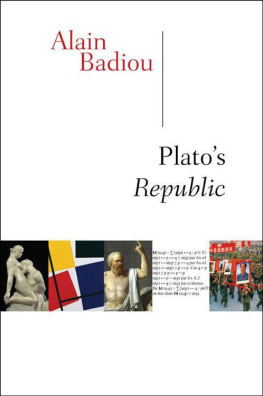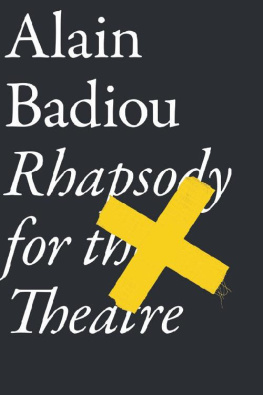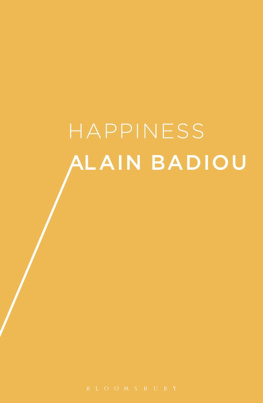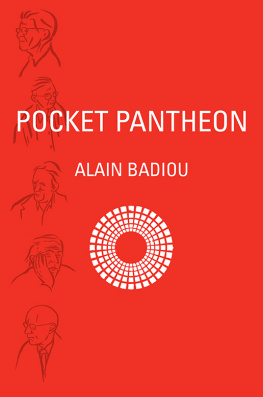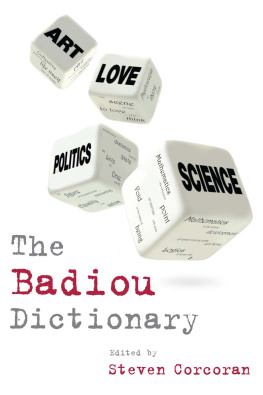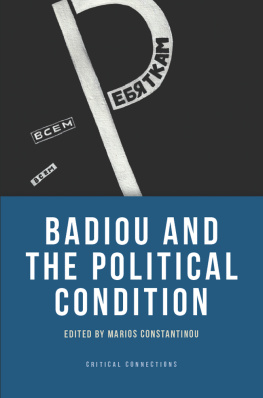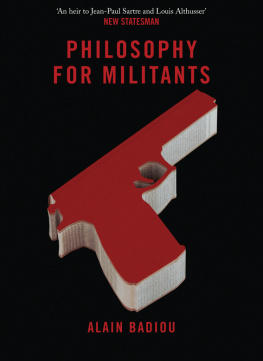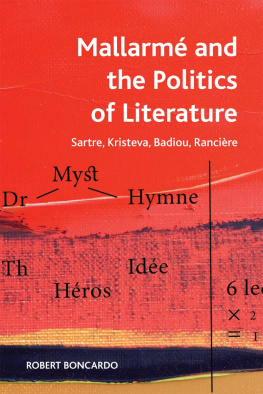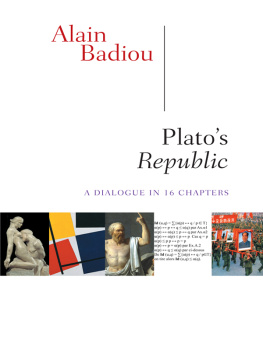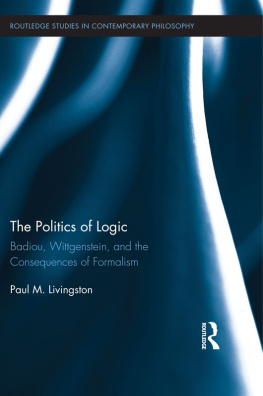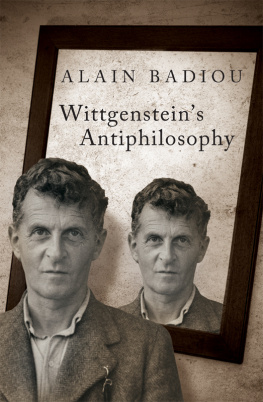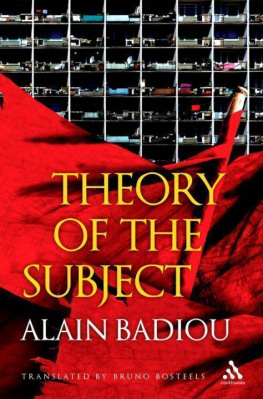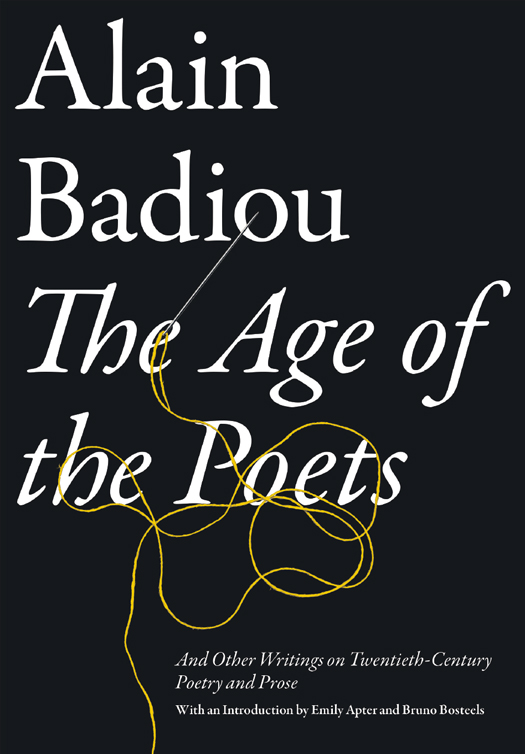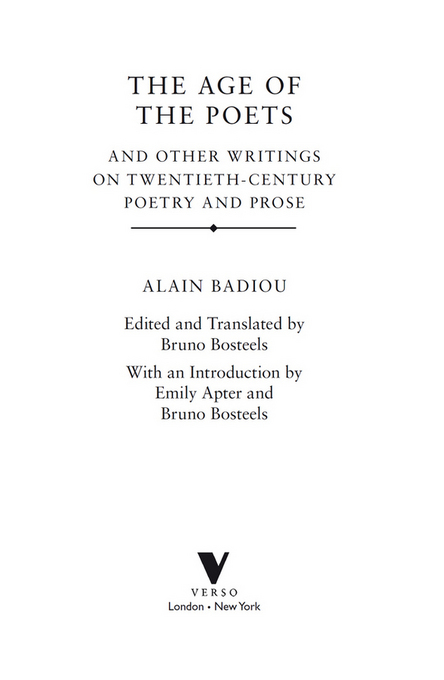
This book is supported by the Institut francais as part of the Burgess programme
www.frenchbooknews.com
First published by Verso 2014
Translation Bruno Bosteels 2014
Introduction Emily Apter and Bruno Bosteels 2014
Parts of the introduction were previously published as Forcing the Truth in Bruno Bosteels, Badiou and Politics (Durham, NC: Duke University Press, 2011) and in Emily Apter, Laws of the 70s: Badious Revolutionary Untimeliness, Cardozo Law Review 29.5 (April 2008)
All rights reserved
The moral rights of the authors have been asserted
Verso
UK: 6 Meard Street, London W1F 0EG
US: 20 Jay Street, Suite 1010, Brooklyn, NY 11201
www.versobooks.com
Verso is the imprint of New Left Books
ISBN-13: 978-1-78168-569-3 (PB)
ISBN-13: 978-1-78168-570-9 (HB)
eISBN-13: 978-1-78168-571-6 (US)
eISBN-13: 978-1-78168-710-9 (UK)
British Library Cataloguing in Publication Data
A catalogue record for this book is available from the British Library
Library of Congress Cataloging-in-Publication Data
A catalog record for this book is available from the Library of Congress
v3.1
CONTENTS
INTRODUCTION
The texts collected in this volume correspond to Alain Badious work from the past fifty years on poetry and novelistic prose. Almost all of these texts essays, prefaces, talks and reviews not yet included in previous books are translated here for the first time. Some proved nearly impossible to locate, while others have yet to be published even in French. Taken together, they provide the reader with a broad vista onto a much underappreciated aspect of Badious oeuvre, which includes not only four novels of his own hand but also a relentless and longstanding engagement with modern literature that starts in 1965 with The Autonomy of the Aesthetic Process and continues all the way to his most recent talk on Poetry and Communism in the spring of 2014 at the Sorbonne.
Two great polemics run through these texts. The first and most recent polemic, which is the principal impetus behind the writings from the 1990s on the so-called age of the poets, takes aim at those ways of thinking of the link between poetry and philosophy that we can find in Martin Heideggers writings as well as in the critical work from French readers of Heideggers thinking such as the late Philippe Lacoue-Labarthe. The second and much older polemic, hearkening back to the late 1960s, refers to the novelistic effect in a critical rejoinder to the way in which literature is situated in relation to the epistemological break between science and ideology that we have come to associate with the canonical work of Louis Althusser, as well as that of disciples of his such as Pierre Macherey. Thus, in addition to providing the interested reader with a systematic account of Badious own take on the role of literature in and for philosophy, The Age of the Poets and Other Writings on Twentieth-Century Poetry and Prose also represents a theoretical settling of accounts with the mostly parallel yet similarly dominant strands of contemporary thought that are Heideggerianism and Althusserianism.
In both cases, moreover, the stakes are far from being limited to the age-old rivalry between philosophy and poetry a jealous rivalry that was old already for the Ancients, as seen most notably and predictably in Platos Republic. Rather, the uncomfortable rapport, or non-rapport, between poets and philosophers is at the same time rife with ideological tensions, hidden obstacles, and as-yet-unfulfilled promises. Philosophy and poetry, in other words, are secretly triangulated by politics. Thus, it is fitting that the first half of this collection should open with the title-essay The Age of the Poets, only to conclude, via Wallace Stevens and Pier Paolo Pasolini, with a return to the question of the essential link between poetry and communism in light of the unique internationalist experience of the civil war in Spain that brought together the likes of Csar Vallejo, Pablo Neruda, Paul luard and Nzim Hikmet. Thus, also, if Nazism inevitably casts its long and ominous shadow over the polemic with Heideggers readings of Friedrich Hlderlin or Georg Trakl, or with the same masters silent non-response to Paul Celan, by contrast, in the second part of this collection, the theoretical detour through Althusserian Marxism will be taken to task slowly but surely in order to raise anew the question of the egalitarian political destiny of narrative prose, following a requiem for the old Marxism, among writers as diverse as Severo Sarduy, Natacha Michel and Pierre Guyotat.
Some thirty years ago, in Peut-on penser la politique?, Badiou already proposed a similar rule of thumb that is also applicable to The Age of the Poets: For those of us who, like me, accept that literature can name a real to which politics remains closed, there is room here to open a literary polemic. Speaking of what he would later come to name, borrowing an expression from Mallarms poetry, the obscure disaster of the death of Soviet communism, Badiou admits:
However, promptly proceeding to contrast the Christic, nationalistic and staunchly antidemocratic ideology of The Gulag Archipelago with the ethical simplicity of a few principles and the universality of an unshaken will in Varlam Shalamovs short stories collected in Kolyma: Stories of Life in the Camps, Badiou warns against the naive glorification of literary evidence in and of itself: We should not pick the wrong writer, when it is art that governs the possibility of political thought. No matter how great Solzhenitsyn is, his grandeur mirrors the dark grandeur in which Stalin consummated the red disaster.
As for the polemic with Heidegger, this should not be misunderstood as if to suggest that the age of the poets were
Badiou certainly admits the greatness of Heideggers thinking. He opens Being and Event by referring to the author of Being and Time as the last universally recognizable philosopher.This refusal, together with the accompanying search for an alternative ontological orientation that is, the clearing of a path away from poetry and towards mathematics really constitutes the first founding gesture of Badious renewed Platonism. On one hand, the aim is to substitute an axiomatic ontology of subtraction for the hermeneutic ontology of presence and the retreat of presence, or of the enigma and unconcealment of meaning or sense; on the other hand, the project consists in interrupting, through a consistent pursuit of the matheme, the suture of philosophy onto the poem, by taking one further step in the unfolding of the intrinsic power of each of the four generic procedures of truth that are science, politics, art and love.
Suture, in Badious philosophy, has at least two different meanings, neither of which should be confused with how Jacques-Alain Miller in his early days defined the concept in classic texts written for the Lacano-Althusserian journal Cahiers pour lanalyse, a definition that was subsequently popularized both in the direction of film theory, around the journal Screen, and in the political theory of figures such as the late Ernesto Laclau and Chantal Mouffe, above all in Hegemony and Socialist Strategy. For Badiou, suture in the first place describes the way in which the discourse of ontology, as the science of being qua being, is linked onto being through the void. This is how the concept appears in


